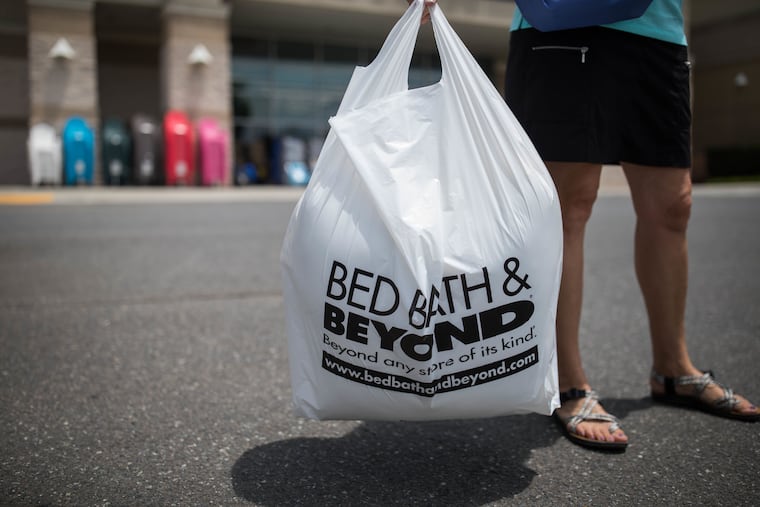Main Line Bed Bath & Beyond store is closing
The only Pennsylvania location on closure list so far is the Bed Bath & Beyond at the Wynnewood Shopping Center.

As Bed Bath & Beyond goes through a seismic downsizing, its Philadelphia-area footprint is shrinking, too.
At the end of August, the company announced that it would close about 150 “lower-producing” stores, but a list of the first 56 stores slated for closure was only released this week.
The only Pennsylvania location so far is the Bed Bath & Beyond at the Wynnewood Shopping Center, where the store currently occupies 61,030 square feet of retail space. The rest of the company’s closures are concentrated in the Midwest, New York, and New Jersey, although none yet in South Jersey. The closest store is in Manalapan Township in Monmouth County.
The company did not respond to requests for comment about how quickly their business will wind down or the number of employees affected. A Bed Bath & Beyond spokesperson would only say that the store would be shuttered “in the coming months,” and that locations in King of Prussia and Jenkintown would remain.
Retail experts say that the Wynnewood Shopping Center’s landlord, Federal Realty Investment Trust, will have no difficulty finding another tenant in that location.
“This is a sizable vacancy on the Main Line, which doesn’t happen that often,” said Steven Gartner, executive vice president of retail services with CBRE. “It’s often a good thing for shopping centers when a tenant that might not be relevant goes away. This is one of those do-overs that landlords get in tight real estate markets.”
Federal Realty Investment Trust did not return requests for comment.
Bed Bath & Beyond has experienced extreme turbulence in recent months, as its stock plunged, it announced mass store closures, and a 20% reduction in staff. The company’s struggles turned even more tragic a couple of days after the announced downsizing, when chief financial officer Gustavo Arnal leapt to his death from a Manhattan high rise.
Bed Bath & Beyond’s troubles arrive amid an uncertain time in the retail industry. In Center City, the marquee Walnut and Chestnut Street corridors are still in flux after the pandemic drove a substantial amount of shopping online.
But some big box retailers, like Target, Macy’s, and Kohl’s, are performing strongly. In high-end suburban areas, like Philadelphia’s Main Line, retail sales have remained strong. That’s partly because the square footage available has not changed substantially, as new development tends to be scarce in wealthy inner-ring suburban areas.
“Main Line retail remains extremely desirable and competitive for a few reasons,” Gartner said. “Very high barriers to entry, there’s virtually no development sites, so properties like Wynnewood Shopping Center remain highly desirable.”
The Wynnewood retail hub dates to the 1950s, during the postwar boom when the number of American suburban shopping centers exploded from eight in 1946 to 4,000 in 1960. It marked the first of John Wanamaker’s department stores to open outside the central city. Today, Bed Bath & Beyond occupies the space where Wanamakers once was.